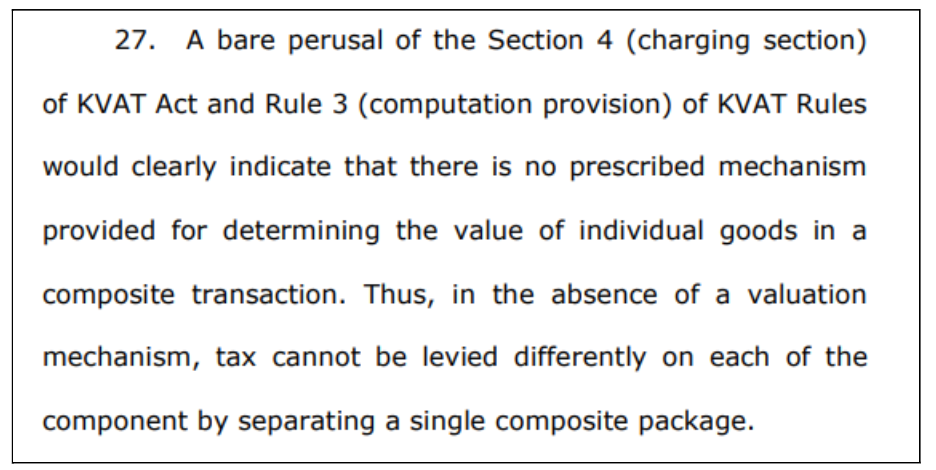In this week’s review of Court Judgments, we look at Supreme Court’s judgment in which it remarked that the Courts’ power to transfer cases to specialized investigating agency must be used sparingly, that a person acquitted of charges need not imply that they should be reinstated to service, that a mere fact of commission of suicide by itself is not sufficient to raise the presumption of abetment by husband and relatives under Section 113A of Evidence Act, among others.
SC: Courts’ power to transfer cases to specialized investigating agency must be used sparingly
In the case, Royden Harold Buthello & Anr vs. State Of Chhattisgarh & Ors, the Supreme Court was considering an appeal of a person who was accused of alleged possession and sale of psychotropic NDPS substance. In his appeals, he challenged two orders of the Chhattisgarh High Court which denied his request to transfer the case to the CBI and to quash the chargesheet and proceedings initiated against him.
The Supreme Court Bench of Justices AS Bopanna and Ahsanuddin Amanullah referred to various judgements of the Court and noted that the power to transfer the investigation is an extraordinary power. It added that even though there aren’t flexible guidelines with respect to transferring cases, it should be done only in exceptional circumstances. Such circumstances may be those wherein the Court has no other option but to transfer the case to the CBI or such specialized investigating agency with expertise for investigation, to ensure a fair trial.
In this case, the appellant contended that he was being ‘framed’ and asked for a detailed investigation. However, the Supreme Court dismissed the appeals and stated that it did not find any issue of public importance that called for a CBI investigation. Further, the Court noted that in any event, the appellants have a further remedy in the legal course, even if it is established that the charges were framed.
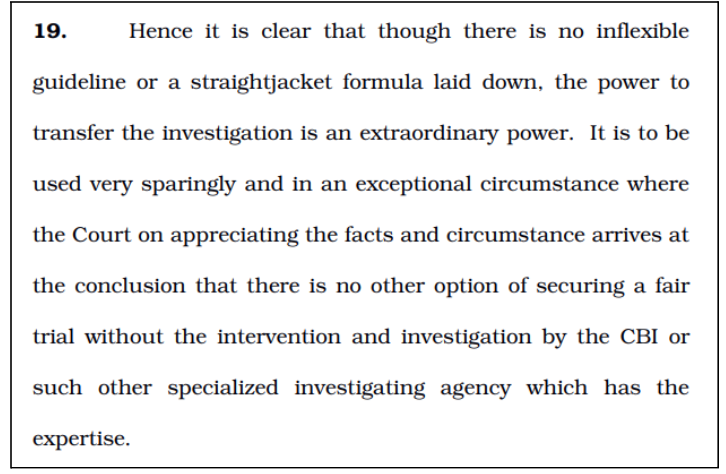
SC: A person acquitted of charges need not imply that they should be reinstated to service
The petitioner in Imtiyaz Ahmad Malla vs. State of Jammu & Kashmir was given an appointment to the Jammu and Kashmir Executive Police as a constable in 2009. However, when his fingerprints were sent to the Fingerprint Bureau under the National Crime Records Bureau for record and reference purposes, it was found that the petitioner was involved in a case in 2007. The case was registered under Section 379 of Ranbir Penal Code (theft) and Section 6 of the Forest Act. During enquiry, it was also found that the petitioner was arrested for 4 days and then released on bail which meant that the petitioner had knowingly suppressed the information from the department. Moreover, the petitioner had shown his residence in another village to get a clean chit at the time of police verification. Due to these reasons, the department cancelled the appointment.
He filed a petition against the cancellation with the Jammu and Kashmir High Court which dismissed his appeal on grounds that the decision of the Director General of Police, the highest functionary in the hierarchy of the police department, with respect to the appointment of the appellant was not to be questioned. The Supreme Court Bench of Justices Ajay Rastogi and Bela M Trivedi upheld the same while observing that just because a person is acquitted or discharged, it cannot be inferred that he was falsely involved or had no criminal antecedents. Further, as held in earlier judgements, a mere acquittal does not entitle an employee to reinstatement in service.
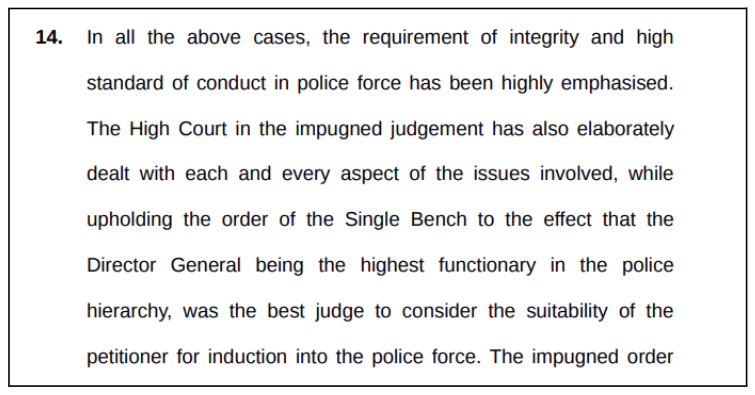
SC: Mere fact of commission of suicide by itself is not sufficient to raise the presumption of abetment by husband and relatives under Section 113A of Evidence Act
The case, Kashibai vs. State of Karnataka, involved the suicide of a woman because of mental and physical harassment from her husband and his family for dowry. The family was convicted under Section 498A and Section 306 read with Section 34 of IPC by the Sessions Court. Even the High Court upheld the conviction. The Supreme Court while hearing the appeal noted that there was enough evidence to establish that the deceased had undergone harassment for dowry. But the question raised was whether the appellants were punishable under Section 306 read with Section 34 of IPC, for abetment to suicide.
The Supreme Court Bench comprising of Justices Ajay Rastogi and Bela M Trivedi observed that there was no evidence to show that the death was a suicide. Moreover, even if the deceased had committed suicide, there was no evidence to establish that any of the appellants had instigated or intentionally aided or abetted the deceased to commit suicide.
The Bench added that the mere fact of the commission of suicide by itself would not be sufficient for the court to raise the presumption under Section 113A of the Evidence Act, and to hold the accused guilty of Section 306 IPC. Under Section 113A of the Evidence Act, the Court may presume that the suicide was abetted if a married woman commits suicide within 7 years of marriage and her husband or his relatives have subjected her to cruelty. However, in this case, the Bench stated that the mere fact of the commission of suicide by itself was not sufficient for the court to raise the presumption under Section 113A of the Evidence Act, and to hold the accused guilty of Section 306 IPC. The Bench convicted the appellants for domestic violence under Section 498A but acquitted them of charges levelled against them under Section 306 of IPC for abetment to suicide by giving them the benefit of the doubt.
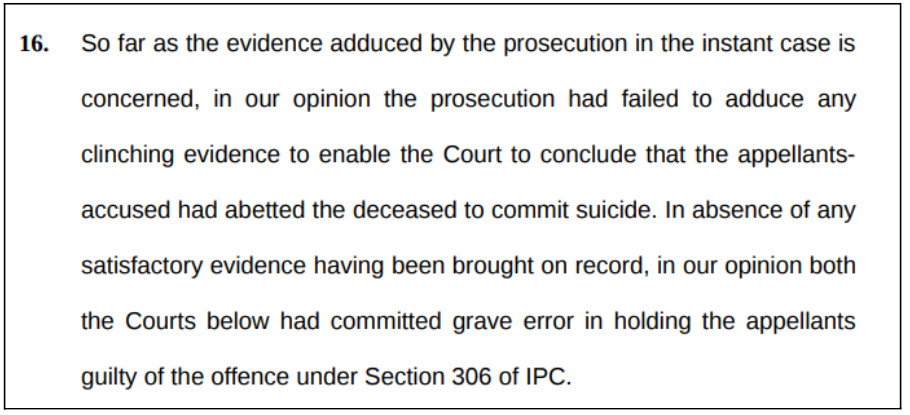
SC: Schools should have playgrounds and students are entitled to good environment in school
In State of Haryana vs. Satpal & Ors, the apex Court was hearing an appeal filed by the State of Haryana against the order of the High Court regarding the regularization of encroachments near a school. The respondents in this case were in unauthorized possession of Panchayat’s land. They had encroached land on the premises of a government school belonging to Gram Panchayat which was reserved for the school playground.
When this came to light in 2015 in front of the High Court, the respondents were willing to give equivalent vacant land in exchange, for adjoining the school. The Court also directed the authorities to demarcate vacant areas and residential plots from the encroached areas for the school to use. Further, it suggested exploring the options of taking alternate lands offered by the occupants to double the extent of the area under occupation or legalize the occupation by taking the market value.
The Supreme Court Bench of Justices MR Shah and BV Nagarathna observed that the school did not have any playground at all and was surrounded by unauthorized construction made by the respondents. The Bench noted that the encroached land cannot be legalized as there cannot be any school without a playground. Students who study in such a school are entitled to a good environment, it added. Holding the High Court’s order to legalise the encroachment as erroneous, the Bench quashed the order passed by the High Court. Further, it also gave the respondents a year’s time to vacate the illegal occupation.
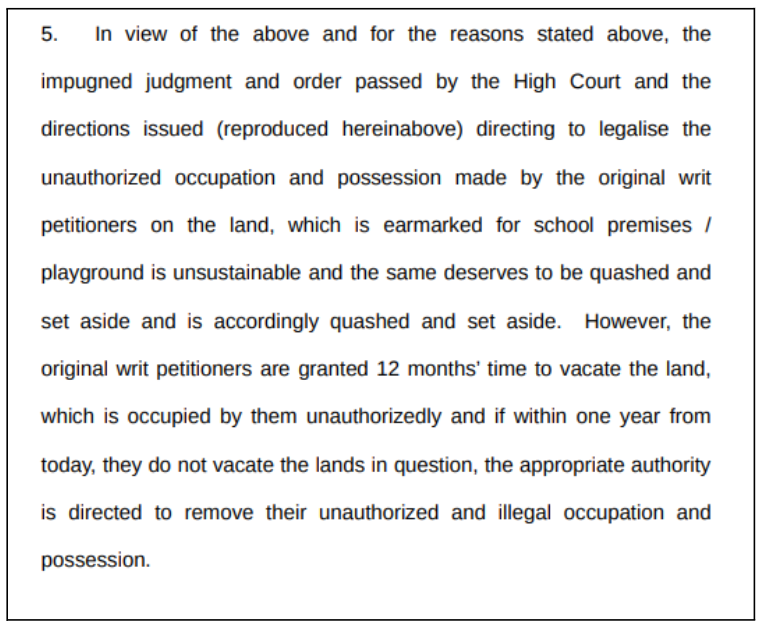
Karnataka HC: Mobile chargers that come along with phone in ‘one set’ should not be taxed separately
In The State of Karnataka vs. The Index Technologies India Ltd., the respondents were registered dealers under the Karnataka Value Added Tax Act, 2003. They were involved in the mobile phones, parts, and accessories business. The company sold mobile phones in composite packages that include accessories such as headsets, cables, ejection pins, adapters, chargers, manuals etc.
For the period, 2011-12 to 2013-14, the assessing officers passed an order under section 39(1) of the KVAT Act, 2003 subjecting the sales turnover of mobile chargers to tax at the rate of 13.5% to 14.5%. Dealers filed an appeal against this order which was dismissed by the Joint Commissioner of Commercial Taxes (Appeals). Karnataka Appellate Tribunal allowed the appeal. The State filed the revision petitions in the High Court.
When considering the bunch of revision petitions, the Karnataka High Court bench of Justice P.S. Dinesh Kumar and Justice T.G. Shivashankare Gowda, held that the charger that is sold along with the mobile phone in one composite package or ‘one set’ is taxable at the rate of 5% and dismissed the petitions. It added that the intention of a purchaser or seller while buying or selling a ‘Mobile Set’ is to buy or sell the mobile phone and not the charger alone. Supply of charger, headset, and ejection pin is incidental to the sale.
